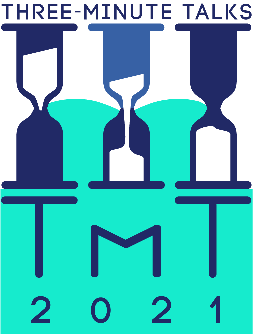Dr. Aisha Burton Okala Makes 1000 Inspiring Black Scientists in America List
Congratulations to Aisha Burton Okala, PhD, for being named one of 1000 inspiring black scientists in America, featured on the Cell Mentor website. Dr. Burton Okala is a postdoctoral fellow in the laboratory of Dr. Gisela “Gigi” Storz, where she studies the regulatory roles of small proteins on two component systems in E. coli . Following her postdoc, Dr. Burton Okala hopes to join the ranks of academia as a professor—and from the looks of it, she is well on her way!
Three-minute Talks (TmT) Competition Deadline to Enter: February 8
Don’t miss your opportunity to enter the 2021 TmT Competition!

- Learn how to explain your research effectively to a broad scientific audience, in three minutes or less, with one-on-one professional training from public speaking coach Scott Morgan.
- Get the chance to win up to $1,000 for use towards approved training or scientific conference participation.
To enter, complete the submission form by Monday, February 8. The submission form, competition rules, and judging criteria are available at the NICHD TmT Webpage. Up to 10 DIR fellows (postbac, predoctoral, postdoctoral, visiting and clinical) are invited to compete for these science communication honors.
Mandatory Training for All Trainees: Your Rights and Responsibilities as an NIH Trainee
OITE will provide a virtual mandatory training for all trainees (IRTAs and Visiting Fellows) regarding your rights and responsibilities as a trainee, especially around new policies at the NIH. The goal of this session is to provide you with information to make sure that you are safe while at the NIH, and that you know the policies and resources to set yourself up for personal and career success.
Research Fellows and Clinical Fellows are encouraged, but not required, to attend.
Participation is tracked by the NICHD Office of Education.
If you have successfully completed this training in the past (it was offered virtually on Nov-Dec of 2020), you do not need to attend again. This is only for trainees who have never taken the training or have not successfully completed it. The OITE will offer this session monthly.
See below for dates/times. Please register using your NIH email. Non-NIH email registrations will be deleted. You only need to attend one session .
February 10, 2021
10:00–11:00 a.m.
Registration: https://nih.zoomgov.com/webinar/register/WN_YtU8qoTvTwOowd_CnPsB1w
March 23, 2021
10:00–11:00 a.m.
Registration: https://nih.zoomgov.com/webinar/register/WN_Idem9zCeTCerjlfLOKYT_A
NIH Grant Writing Course
Are you planning to apply for a NIH research grant in 2021? There are various application due dates for NIH grants, and we are offering a virtual grant writing course that’s just for you!
In collaboration with three other institutes, we are offering an NIH Grant Writing Course for fellows this April and May. Led by Dr. Paula Gregory (Professor, Department of Genetics, Louisiana State University), this course will help students prepare a successful NIH grant proposal, with special emphasis on the career transition “K” grant series. With high reviews from past participants, NHGRI has offered this course for several years, and as a result, many of their fellows have been awarded NIH grants!
The classes will combine didactic presentations with group discussions, assignments, and proposal writing. A distance-learning component will allow you to submit writings between the virtual meetings and receive edits and valuable feedback. Participants will also conduct an NIH mock study section. During the process of scoring real grant applications, trainees will learn about the review process and the key aspects of a successful application.
Below is the schedule for this on-campus course (must attend all sessions):
- April 15: 1 p.m.–4 p.m.
- April 16: 9 a.m.–12 noon
- April 22: 11 a.m.–4 p.m.
- April 23: 9 a.m.–12 noon
- May 6: 1 p.m.–4 p.m.
- May 7: 9 a.m.–12 noon
There are four spots available for NICHD fellows. If you would like to join this course, please email Dr. Erin Walsh (erin.walsh@nih.gov) and indicate which NIH grant you are planning to apply for.
NIH IPPCR Course Online: Registration Still Open
Interested in expanding your clinical research knowledge base in 2021? Registration for the 2020–2021 NIH Introduction to the Principles and Practice of Clinical Research (IPPCR) course is still open!
This free, self-paced, online course is open for registration until July 1, 2021. Graduate students, clinical fellows and post-doctoral fellows are encouraged to enroll now.
The IPPCR course is a lecture series from thought-leaders around the world covering:
- Study designs, measurement, and statistics
- Ethical, legal, monitoring, and regulatory considerations
- Preparation and implementation of clinical studies
- Communication of research findings and other topics
To register, please visit the IPPCR website at https://ocr.od.nih.gov/courses/ippcr.html. If you have any questions, please contact Rebecca Hwang at ippcr2@mail.nih.gov.
NIH PCP Course Online: Registration Still Open
Registration is still open for the 2020-2021 NIH Principles of Clinical Pharmacology (PCP) Course!
The PCP course is a free online lecture series covering the fundamentals of clinical pharmacology as a translational scientific discipline focused on rational drug development and utilization in therapeutics. Topics covered in the course include pharmacokinetics, drug therapy in special populations, drug discovery and development, and pharmacogenomics.
The course is free, self-paced, and entirely online through the PCP website: https://ocr.od.nih.gov/courses/principles-clinical-pharmacology.html.
A certificate of completion is awarded to participants who achieve a passing score on the final exam.
The course will be of interest to graduate students, post-doctoral fellows, and clinical fellows interested in expanding their pharmacology knowledge base.
For additional information on the course, please visit the website above or contact Rebecca Hwang at odpcp@mail.nih.gov.
NICHD Annual Postbac Course: Professional Development and Career Exploration
Our Annual Postbac Course launched on Wednesday, January 13, but it’s not too late to join our group!
Currently there are over 100 postbacs conducting clinical and basic science research in our intramural laboratories. During your one or two years of training here at the NICHD, we want you to have an enriched research experience, while at the same time growing more prepared and excited about your chosen career path.
The year’s course will be entirely virtual and will be held on Wednesdays, from 1 to 2 p.m. The intent is to create a comfortable environment within a small group of peers to help postbacs improve their analytical skills as scientists, while expanding their knowledge of biomedical research and its relevance to human health. This course also focuses on professional development: learning how to present your science, exploring different career trajectories, meeting physicians and scientists from various clinical or research settings, and preparing for the medical or graduate school application cycle (including interviews!).
You’ll hear from a senior NICHD postdoc; a panel of physicians will share their personal and professional experiences in practicing as a pediatrician; and there will be a “Meet the Scientist” series where scientist in clinical, basic science, and industry laboratories will share their career journeys.
Schedule of Upcoming Topics
| February 10 | Meet the Scientist: Basic Science Research |
|---|---|
| February 17
*Session begins at 12 noon* |
Meet the Physician (Panel) |
| March 3 | Meet the Scientist: Clinical Research |
| March 10 | The Medical School Personal Statement |
| To Be Announced | Meet the Scientist: Industry Career Panel |
| To Be Announced | Postbac Poster Day: Organizing and Presenting Your Work |
| To Be Announced | Journal Club Session: Cloning a Gene—How to, and Practical Applications |
| To Be Announced | The Graduate School Search and Application Process |
| To Be Announced | Knowing Your Why? The Key to the Medical School Interview |
| To Be Announced | The Graduate School Personal Statement |
Stay-tuned for the final schedule, which will be announced by email soon.
Enrollment in this course will be limited to 25 students to allow maximum participation and interaction with the instructors. At the end of the course, we will offer a certificate of recognition for all postbacs who attend at least seven sessions.
If you are interested in joining the class, please email Monica Cooper cooperm@mail.nih.gov to register, and let her know which sessions you plan to attend.
Interested in Conducting a Literature Review?
There are many types of reviews—narrative, rapid, scoping, and systematic—all with different methodologies to use. The NIH Library’s Systematic Review Service can help you select the best type of review and methodology to use for your research. We offer software, classes, consultations, and resources to guide you through the entire process.
New at the NIH Library: Covidence Software
The NIH Library now offers Covidence, an online tool for managing and streamlining your systematic review. Covidence can help you screen and administer citations, conduct data extraction, and perform critical appraisal. Contact Alicia Livinski, alicia.livinski@nih.gov, to request access and for assistance with using Covidence.
Classes
>The NIH Library is offering a series of one-hour webinars on systematic reviews. The February calendar of classes on systematic reviews may be found on the NIH Library website.
Consultations
NIH Librarians are available to help you select the appropriate type of review for your needs, and then identify and complete the steps of your review, conduct the literature search, and edit the final manuscript. Schedule a consultation to get started today.
Databases
The NIH Library provides access to the three primary databases used for most systematic reviews, and others are sometimes necessary. Talk to a NIH Librarian to learn more about each database, including relevant search functions.
Cochrane Library
Contains high-quality, independent evidence to inform health care decision-making, including the Cochrane Database of Systematic Reviews and the Cochrane Central Register of Controlled Trials (CENTRAL), a curated registry of randomized and quasi-randomized controlled trials conducted worldwide.
Embase
Allows users to build comprehensive literature searches through its extensive, deeply indexed database and flexible search options. By applying the PICO (Patient or Problem; Intervention; Comparison or Control; and Outcome) framework, users can structure searches that address clinical questions.
PubMed/MEDLINE
Features advanced search functions and filters to find literature for your systematic review.
To stay up to date on NIH Library classes, events, resources, and services, subscribe to our e-news.

